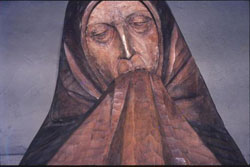
Feastday: January 13
Patron: of brides, large families, and widows
Birth: 1158
Death: 1228
Blessed Yvette has not been canonized, but she is considered a saint. Blessed Yvette (Jutta of Huy), Widow (Feast day - January 13) Endowed with extraordinary charisms, Yvette was a product of the development of mysticism in the Low Countries in the thirteenth century. In this she joined a select number of young women Christians such as Juliana of Cornillion, Eve of St. Martin, Isabel of Huy, Mary of Oingnies, Ida of Leau, Ida of Nivelles, Ida of Loviano, Christiana of St.-Trend, Lutgard of Tongres, and Margaret of Ypres.
She was born of a wealthy family of Huy near Liege in 1158 and when very young was married off by her parents. Five years and three children later, she was a widow at the youthful age of eighteen. There was no dearth of suitors, drawn by her uncommom beauty, but Yvette would have none of them. She dedicated herself for eleven years to caring for lepers out of surpassing love for God.
For the last thirty-six years of her life, the holy woman lived as an anchoress and had many mystical experiences. Her prayers and miracles made her famous. She succeeded in bringing her father and one of her two remaining children back to the Faith and solicitously aided the countless people who flocked to consult her in her hermitage. She died on January 13, 1228.
Jewelry Sale 15% OFF
FREE Shipping over $60
Yvette of Huy (1158 – 13 January 1228) was a venerated Christian prophet and anchoress. Born in Huy, Belgium, she was also known as Ivette, Ivetta, Jufta or Jutta.
Life
She was born into a wealthy but not particularly religious family, close to the bishop of Liège, and from an early age tried to live a religious life from her home. Her father was a tax collector. Yvette was forced into an arranged marriage aged thirteen and had three children (one died while still an infant) before she was widowed at eighteen. She used the opportunity to retire to a leper derelict hospital in Statte, close to Huy, on the heights of the river Meuse to tend to the inmates, and more fully follow her religious calling.
She left her two sons in the care of their grandfather. Ten years later, she became an anchoress and was enclosed in a chapel cell near the colony in a ceremony conducted by the abbot of Abbaye Notre-Dame d'Orval. From there she offered guidance to pilgrims who considered her a prophetess in the apostolic sense of having insight into the divine. She summoned priests and even the dean of the local church to her presence and confronted them about their behaviour. She was responsible for the conversion of her father and one of her two surviving sons. After a time, her power threatened the male clergy and canons. She was denounced. Yvette died on 13 January 1228 in Huy, Belgium.
Her life was recorded by the Premonstratensian Hugh of Floreffe.

